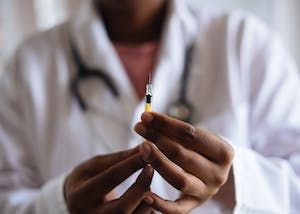Article
New Initiatives Improve Vaccination Rates in Pediatric Patients with IBD
Author(s):
Data show a 23.5% increase in influenza vaccination rates.

Data show vaccination rates continue to be low among patients with inflammatory bowel disease (IBD), due to barriers including perceived lack of benefit, fear of side effects, and inconvenience.
A new study aimed to improve effective strategies to increase influenzas vaccine rates, as well as evaluate vaccination practices, in pediatric patients receiving biologic infusions.
Investigators, led by Sharmistha Rudra, MD of the Children’s Hospital of Philadelphia, found the initiative led to a 23.5% increase in vaccinations in IBD patients receiving biologic infusions.
The results were presented during the 2021 Digestive Disease Week Virtual Meeting.
Study
Investigators noted that at the IBD center, there are approximately 1700 patients.
In this patient population, there was an influenza vaccination rate of 40.3% for the IBD population and 45.5% for patients receiving biologic therapies at the infusion center (n = 772).
The new initiative to increased vaccination outcome by 20% at the end of the 2020-2021 influenza season.
Investigators used plan-do-study-act cycle models, including the formation of a multi-disciplinary team to review vaccination barriers.
It also included the distribution of a survey to caregivers or IBD patients ≥18 years old to investigate the vaccination decision making process, awareness of recommendations, and impact of vaccine availability in the infusion center on uptake.
Then, the team optimized access in patients receiving biologic therapies, with strategies including education sessions with division providers and infusion center nurses.
Other strategies included the creation of an electronic medical record (EMR) order set and active phone screening of population prior to infusion visits, when unvaccinated patients were offered the vaccine during the appointment.
The investigators used Chi squared analyses to compare survey responses between caregivers and patients, with 2 proportion sample tests identifying differences in vaccination rates between 2 influenza seasons.
Results
The survey was answered by 14.4% of the population, with 269 caregivers and 60 patients.
In respondents, 71.3% were on either anti-TNF alpha, including infliximab or adalimumab, or vedolizumab and 13.4% were unvaccinated in 2019 – 2020.
The team found 33% of patients receiving infusion biologic therapy had interest in getting the vaccine at the time of appointment.
Investigators noted the top reasons for non-vaccination were “unsure of safety” (31.8%), “unsure of benefit” (29.5%), and “forgot to schedule” (13.6%).
Data show both patients and caregivers had similar vaccine impressions, with investigators finding no statistically significant differences.
The investigators note that for the 2020-2021 season, 88.75% plan to get vaccinated and 51.7% have expressed an interest in receiving the vaccine during the infusion appointment.
Conclusion
The team concluded that the implementation of the initiative has increased the vaccination rate by 23.5% in patients on infusion biologic therapy.
They noted that pre-screening prior to appointments and access in conjunction to appointments were the most effective strategies to increase vaccination uptake.
“We plan to apply these effective QI strategies to optimize COVID-19 vaccination uptake in our IBD population,” investigators wrote.
The study, “Improving Influenza Vaccination in Pediatric Inflammatory Bowel Disease: A Quality Improvement Initiative,” was published online by DDW.



